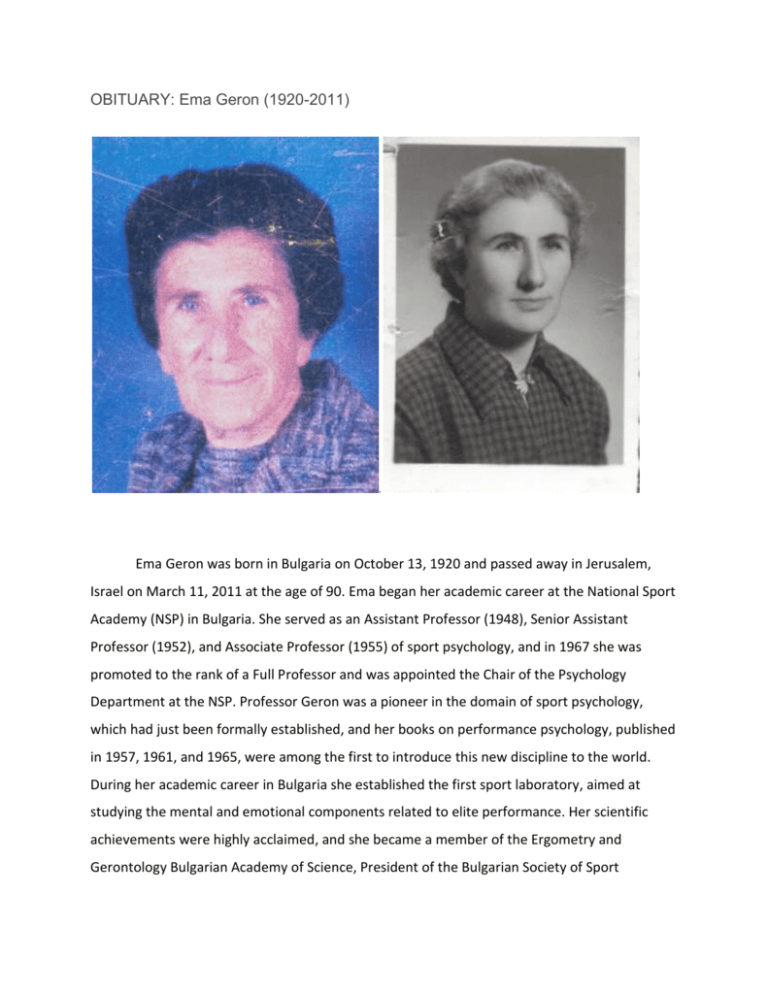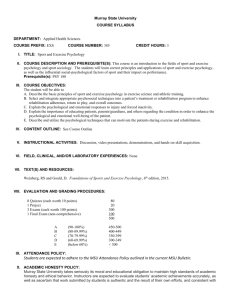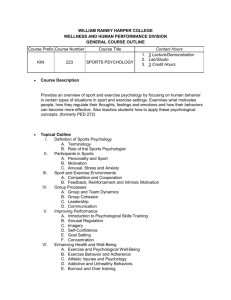click me!!
advertisement

OBITUARY: Ema Geron (1920-2011) . Ema Geron was born in Bulgaria on October 13, 1920 and passed away in Jerusalem, Israel on March 11, 2011 at the age of 90. Ema began her academic career at the National Sport Academy (NSP) in Bulgaria. She served as an Assistant Professor (1948), Senior Assistant Professor (1952), and Associate Professor (1955) of sport psychology, and in 1967 she was promoted to the rank of a Full Professor and was appointed the Chair of the Psychology Department at the NSP. Professor Geron was a pioneer in the domain of sport psychology, which had just been formally established, and her books on performance psychology, published in 1957, 1961, and 1965, were among the first to introduce this new discipline to the world. During her academic career in Bulgaria she established the first sport laboratory, aimed at studying the mental and emotional components related to elite performance. Her scientific achievements were highly acclaimed, and she became a member of the Ergometry and Gerontology Bulgarian Academy of Science, President of the Bulgarian Society of Sport Psychology, and Vice-President of the Association of Bulgarian Psychologists. In 1965 Ema attended the first congress of the International Society of Sport Psychology (ISSP). The congress in Rome exposed Ema to the small international community of sport psychologists at that time. Following the ISSP congress Ema, together with Svetlana Dimitrova, organized the International Scientific Conference on the Problems of the Psychological Preparation of Athletes, which took place in Varna, Bulgaria in December, 1968. In Varna Ema and her European colleagues proposed the establishment of the European Association for Sport Psychology. Ema strongly supported this idea. After writing the first statutes for the society, the Fédération Européene de Psychologie des Sport et des Activitées Corporelles (FEPSAC) was founded in Vittel, France in 1969, and Ema Geron was elected as its first President. She considered FEPSAC as her "baby", and navigated the federation through its first stormy years, chairing altogether 10 Managing Council meetings up to the 1973 ISSP congress in Madrid. Moreover, Ema served the ISSP as a managing council member from 1968-1973 as a member– at-large, from 1973-1977 as ISSP Vice-President, and again as a member-at-large from 19811985. Her international status was recognized and valued by delegates and scholars worldwide. In 1973 Ema immigrated with her husband to Israel, due to political problems her husband encountered in Bulgaria. After her immigration to Israel, she no longer was considered as a representative of Bulgaria in various International forms, and was forced to resign from all her duties, including the FEPSAC presidency. She was also expelled from all her positions and duties by the Bulgarian organization she had established and led. At the time, Ema expressed her sadness and disappointment at these moves to her close friends. Most troubling to her, and to her husband, was the fact that her son Ilia was prevented from joining them by the Bulgarian Communist authorities. He continued to live in Bulgaria for a number of years until he was permitted to join his parents in Israel. Ema's immigration to Israel was strongly supported by Dr. Gilad Weingarten, the first sport psychologist in Israel, and by Mr. Yariv Oren, then the director of the Israel’s Sport Authority. Upon arrival in Israel, Ema developed the sport psychology laboratory at the Center for Research and Sport Medicine (currently named the Ribstein Center for Sport Medicine and Research) at the Wingate Institute, located in the city of Netanya. Ema quickly learned the Hebrew language, and became a prolific sport psychology lecturer in the Zinman College of Physical Education and Sport Sciences at the Wingate Institute. She established the Israel Sport Psychology and Sociology Society, and was elected its first President. In her work in Israel, Ema taught undergraduate and graduate classes in sport psychology, motivation in sport, and motor learning. For many years, her book entitled Mental Preparation for Athletes (translated from German to Hebrew in 1976) was used as the main source for her undergraduate classes. In fact, it was the first scientific book on sport psychology published in Israel. Throughout her years at the Zinman College, Ema not only was involved in teaching, but also in many research projects conducted with other staff members and with graduate students. She organized a number of international and national conferences in sport psychology and motor learning in Israel, edited several of books, and published scientific and applied articles on sport psychology and motor learning (mainly in Hebrew). During her weekly visits to the library at the Wingate Institute, she searched for updated articles and information on different issues in sport psychology, particularly on motivation in sport. She did this for many years, even after retiring from the college at age of 65. Ema played a major role in the establishment of sport psychology and motor learning in Israel. She stimulated many students to continue their education in these disciplines, and was very happy to see them working on research projects associated with psychological aspects of sport. Ema kept up her international involvement by serving as the liaison in Israel for the American Academy of Physical Education (currently the American Kinesiology Academy), and the International Association of Applied Psychology (IAAP). In honor of her major contributions to the field of Sport and Exercise Psychology, the International Society of Sport Psychology (ISSP) awarded her the ISSP Distinguished Scholar Award at the 1993 ISSP World Congress in Lisbon, Portugal, an honor given to only five scholars since the establishment of the society in 1965. Her attendance at the ISSP Congress was among the last opportunities for her former colleagues and students from all over the world to meet her again, and to share with her their news and accomplishments. Ema’s scientific work centred on psychological preparation of athletes for competitions, concentration and volition, and psychological characteristics of athletes as a function of sport- type, all of which were considered milestones for the then newly established domain of sport psychology. Her research on gymnastics, with a special focus on female athletes, may be considered as the dawn of gender perspective in sport psychology. She published several textbooks in English, for example, Children in Sport and Introduction to Sport Psychology. After her formal retirement, Ema continued to be very active. Shortly before she died she saw the publication of her last book, in Hebrew – Motivation for Physical Activity and Sport, which she wrote together with Shulamit Raviv and Ronnie Lidor. On March 11, 2011, Ema Geron left us, surrounded by her friends and her son Ilia. We, and many others who knew Ema, feel saddened at losing a very unique person, a strong woman in the mainly male-dominated sport psychology world at that time, an honored colleague, and especially a loyal and valued friend. FEPSAC, ISSP, IAAP, and all of us – sport psychologists, psychologists, and friends – will remember her fondly and with deep respect. She will always be known as an admirable woman who left a remarkable legacy. May she rest in peace. Gershon Tenenbaum Ronnie Lidor Michael Bar-Eli








